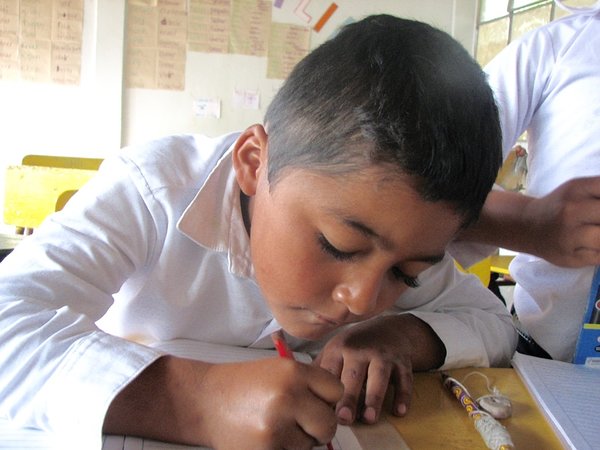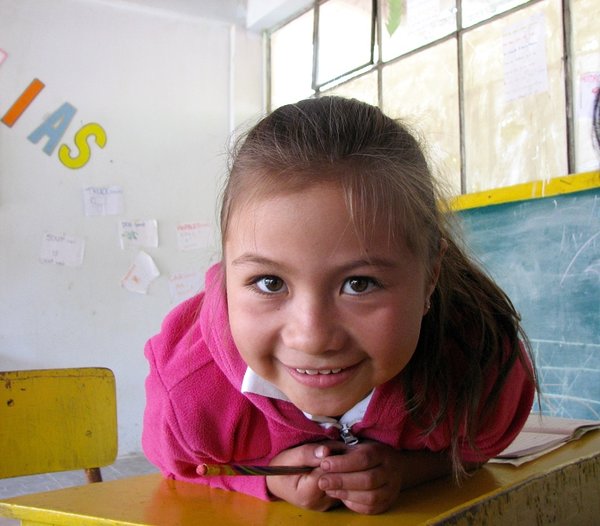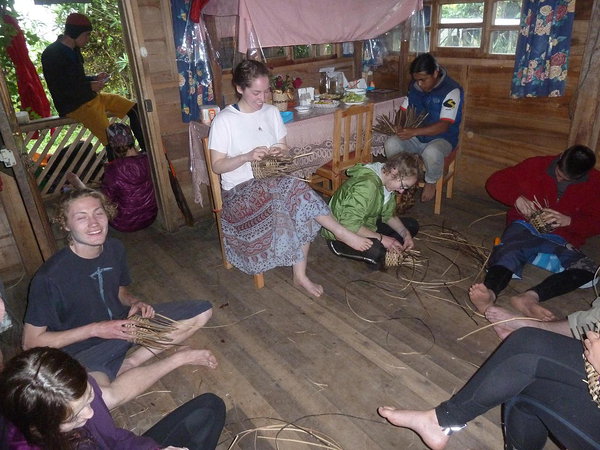Language and cultural/logistical aspects
We recommend that volunteers arrive with basic Spanish, to avoid possibly feeling isolated and frustrated. Perhaps the biggest gift you can make to yourself in the weeks before travelling to Ecuador, is the ability to communicate with local people. Ned and Patricia offer formal Spanish classes for a small charge, and free conversation classes , see homepage menu for more details. Still on the subject of learning Spanish, just by staying with a local family you will find yourself "immersed" in the language. Provided you genuinely want to improve, this approach can give a motivated individual with basic Spanish the chance to make incredibly fast progress that would perhaps be the envy of many a formal language school student - but, of course, it's hard work! This is one of relatively few parts of Ecuador where you will not be surrounded by other english speakers, or by folks trying to practise their english on you!We find that great results are obtained by volunteers who realise that local people actually enjoy your learning experience. These volunteers are unafraid to initiate conversations and ask questions, and understand that this willingness to "connect" with locals is very much appreciated, and is not at all considered a nuisance. Local people are both shy and curious about outsiders, and in most cases would feel flattered if you asked them for help in learning the language.
The level of Spanish needed to enjoy life as a volunteer here is difficult to state, since there are people who are so robust mentally, and so energetic in their desire to learn, that they can literally start from zero, and still thrive on the inevitable frustrations that are a part of rapid "full immersion" language learning. However most, (including me) are not so blessed, and will find that to arrive with a basic, conversational level of Spanish is richly rewarded during their stay here.
The one other qualification that we consider essential is to be open to the unfamiliar (see our section on the cfa "philosophy"). It's great to try to fit in with the local way of life. Potential volunteers need to be aware that Intag is a remote part of Ecuador, and that conditions here are generally clean but basic: for example, showers may not be as hot as they are accustomed to at home; food is good, but cannot rival the variety of modern "supermarket" cultures; some of your favourite foods may not be available. Note again that this is a remote part of Ecuador: internet access is fine in the village of Cuellaje (with wifi, skype, whassup etc) but does not exist in most other parts of the parish, though we do have it at our house. Please don't expect the same relatively standard of living conditions as you would normally get, for example, in Europe or North America - here in Intag, clean but simple accomodation is the norm, as you would expect from folks living on low incomes. That said, we take into account your special preferences when suggesting host families for you, and there is quite a bit of variety to choose from.
There are no ATMs in Cuellaje (nearest ATMs in Otavalo, 3 hours by bus, so please bring enough cash to cover your costs until you are ready for a break in Otavalo).
There are no complicated application procedures - we find that talking, often by email, also by skype if desired, is fine to help visitors discover if what we offer matches well with your expectations.
Some volunteers commit to a placement before travelling, while others prefer to spend a few days with us, perhaps visiting local schools and families, before deciding if they would enjoy spending time in this corner of Ecuador. Both approaches are fine, this is a relaxed part of the world, where people are used to changes of plan.
You can get an independent view of what it's like to work as a volunteer for cloudforestadventure by visiting our blog http://ecotouristadventure.wordpress.com
The archives are well worth a browse, as they're written by previous volunteers.
Notes: On the basis that most volunteers will spend a significant portion of their time in Ecuador travelling as tourists, we recommend that volunteers enter Ecuador on a standard 90 day tourist visa, which is free. Volunteers wishing to spend more than 90 days in Ecuador can buy an additional 6 month visa for approximately $450 at the Quito immigaration office (10 de agosto y Carrion). For more info, visit www.mmrree.gob.ec telf: (593 2)299 3200. You can also carry out this formality more cheaply at some border posts, notably Ipiales.
Some volunteers with a return flight from Quito avoid paying for a 6 month visa by leaving Ecuador a few weeks or days before their free 90 days expire, enjoying travels in Peru or Colombia, and then returning to Ecuador shortly before their return flight date. This is perfectly legal and a good strategy for those wishing to get to know more of Latin America.
Arrival in Quito: Volunteers may like to be met at Quito airport and/or to spend their first nights in Ecuador at the beautiful Quito home of Chari Agea and Felix Castaneda, good friends of the cloudforestadventure project. Chari is an artist and acupuncturist, and Felix is a professional musician with the Orchestra of Andean Instruments. Chari and Felix are frequent visitors to Intag, and can provide detailed information on travel to the area. They are also wonderful cooks (mainly vegetarian). We value their participation with our project, and consider them an important part of the overall experience of Ecuador that we offer volunteers. That said, it's fine if you choose to stay in a hostel during your time in quito (some provide airport pick-up) and make your way to us independently.
You can contact Chari by email (conversational english spoken) :
mevucarinita@hotmail.com
Telephone: ## 593 (0)23211886.
A stay with Chari and Felix is much recommended as a friendly, safe and informative start to your time in Ecuador.
Chari and Felix's prices
- $20 room and lodging, including breakfast
- $4 lunch
- $3.50 Evening meal
- $35 for reception at the new airport and car journey home
- $15 for car transfer between home and the bus terminal to Otavalo




